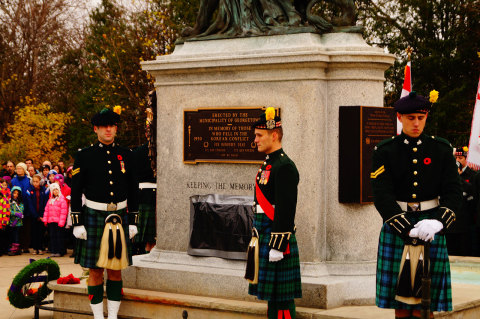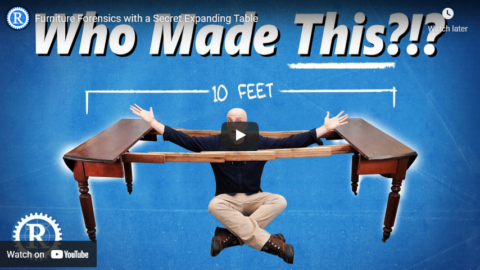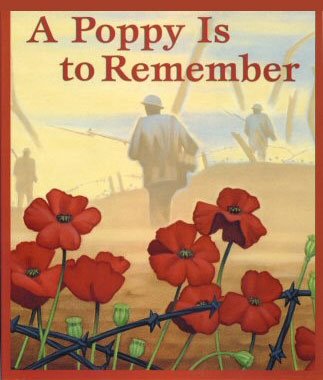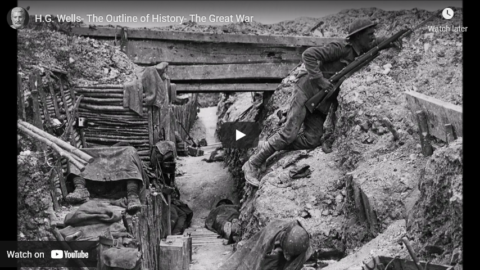In The Line “Tommy Conway” (pseudonym for an active service member of the Canadian Armed Forces) has some thoughts on Remembrance Day and particularly the official ceremonies to mark the occasion:

Members of the Lorne Scots (Peel, Dufferin & Halton Regiment) at Georgetown Cenotaph, 11 November, 2014.
Canadian troops are generally regarded as a practical, irreverent bunch. They absolutely hate that “hoo-ah” stuff you hear south of the border, and resent any attempt to import it. I’ve never met a more snide bunch and I wouldn’t have it any other way. When it comes to Remembrance Day, the most meaningful ceremonies for them involve a few close friends, or a small gathering of colleagues. One veteran related to me a ceremony he had on the job: a well-respected officer asked those present to speak well of lost friends, if they felt like it, then they had a moment of silence and carried on with the job. The least profound experience I’ve had was at the National Memorial in Ottawa, where a bunch of mid-career captains used the event as a way to catch up and barely shut their mouths for the speeches. Not that they missed much: the Chaplain-General took the time to tell us that our brave predecessors sacrificed their lives and youth, in part, to secure a harassment-free workplace. I don’t expect it will get better this year, or ever.
When it comes to local ceremonies, I understand, I really do, that organizers want to convey their thoughts about the fallen and want to do so in detail. Please try to keep speeches few and short, and ceremonies simple and purposeful. The more wreaths at a local ceremony that dignitaries want to lay, the more elements of the program you have, the longer you keep that young private soldier, who was bussed from a base that morning, from having a beer with his or her friends afterwards. For many young soldiers, the post-ceremony refreshment time is where their NCOs open up about the really hard stuff they’ve been through and let the new guys listen. It’s meaningful and right that your local business and civic leaders want to show respect for the dead, but it means more for everyone involved if you do it after the ceremony.
The National War Memorial itself is a great illustration on the pitfalls of trying too hard. Traditionally, the memorial was just let alone by the authorities, except for ceremonies. In 2006, a couple of drunks peed on it. While this was offensive, drunks doing offensive things is a fact of life. A confident society with reasonable people in charge would have let the legal system work out the mischief charges and carried on. Not long after, however, the CAF decided to post sentries at the memorial to guard it from stray drunks. Then, tragically, one of the sentries, Corporal Nathan Cirillo, was murdered in a terrorist attack in 2014 while performing this duty. So now the Ottawa Police guard the sentries, who in turn guard the memorial. Imagine yourself as a Canadian sapper who entered a major firefight in Panjwai, in a bulldozer with steel hastily welded to the windows because the chronically under-equipped CAF had no proper armoured bulldozers available, and think of this obscene waste of everyone’s time and money. If Canadian troops are looking at the memorial from the beyond, they’re looking in disbelief, not reverence. And they’re making snarky comments, too.


 Private William Penman, Scots Guards, died 16 May, 1915 at
Private William Penman, Scots Guards, died 16 May, 1915 at 



